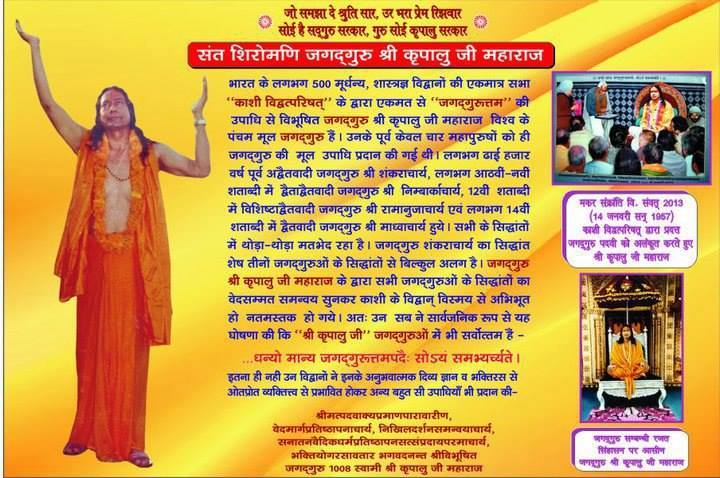Advice to worldly people First of all, spend some quiet time with God every day, even if it just one hour out of 24. During this time, do not pray for better health, more wealth, better job, success in the stock market, to get a better grade, a more... understanding spouse, or more obedient children. Pray that you may accept everything in life as a sign of God’s grace. Moreover, your prayer should not be motivated by fear of hell or greed for heaven, but by pure love of the Divine Beloved. There was once a muslim saint by the name of Shibli. One day he ran through the streets with a torch burning at both ends, shouting again and again, “Burn down Bahishta, i.e. heaven, burn down dozakh, i.e. hell.” People asked him why he, a believer in the Quran, was condemning heaven. He answered, “Because people practice devotion to God for fear of hell and greed of heaven. This sort of worship is wrong. You must love God selflessly.” Next, donate at the very least 10% of your earnings. During the month of Ramdan, the Muslims give what is called ‘jakaad,’ i.e. charity to the poor. Every religion instructs its followers to give 10% to God. The reason is so that you may not become overly attached to the material world. Thirdly, associate always with the right type of people. Not everyone will have a good influence on you. Since God dwells within all, everyone deserves your respect, yet you must be picky and choosy in making friends. Seek the company of those who will help and inspire you on the spiritual path. Tulsidas Ji had instructed Meera to renounce the company of even loved ones if they obstruct the path leading to God. Fourthly, do not read garbage. Do not watch garbage on television. After all, you would not put garbage in your mouth. Why would you put it in your mind? The fifth point I will tell you in the form of a story. Buddha was always travelling along with his disciples, never stopping in any one place for too long. During the monsoon season, however, they would stay in one place for four months. One of Buddha’s closest disciples was a young sannyasi who was tall, well-built and exceedingly handsome. His large peaceful eyes twinkled when he laughed. He walked like a prince, as if he owned the earth. The orange silk robe that he wore, complemented the brilliance of the golden hue of his complexion. He was very wise. His mind was very steady. One day, as he was walking down a street with a begging bowl in hand, a woman came up to him. From her attire, it was evident that she was a courtesan. Casting a flirtatious glance at the young sannyasi she said, “Sir, I invite you to stay at my house for four months during the monsoon season. The sannyasi looked at her. The woman was laughing. There was a challenge in her eyes and tone of voice. He smiled and said, “Thank you for your kind invitation. Let me get permission from my master.” Buddha was sitting in His cottage surrounded by disciples when the young sannyasi asked permission to stay at the courtesan’s house. There was a stunned silence among the disciples. Buddha said, “Certainly, you must accept her invitation.” Suddenly everyone started talking at once. “How is it that a monk is given permission to stay at a courtesan’s house?” “He will surely fall,” said another. The Buddha asked, “Who is stronger – you or she? You are afraid that she will convert you to her ways, but she is not afraid that you might convert her to yours.” Then, turning to the young sannyasi, he said, “Go with my blessings.” The courtesan took good care of the sannyasi. She gave him silky clothes to wear, and he wore them. She served him many delicacies, and he ate them. She sang, he listened. She danced, he watched. But he neither praised nor blamed her for anything. He was non-judgemental, and his mood was as steady as a rock. The other disciples were constantly watching the courtesan’s house and gossiping. Four months passed in this fashion. The monsoon stopped and it was time for Buddha and his disciples to move on. “He is coming! He is coming!” a disciple came running to inform the master. “Master, he is accompanied by a nun,” informed another. “It is the courtesan. She has become a bhikshuni, a nun.” Both the sannyasi and the bhikshuni came in and bowed to the Master. Buddha accepted her as a disciple, and the group left for the next town. This story illustrates my next point. Be steadfast on your path. Do not allow others to contaminate you. Live in the world on your own terms that have been defined by scriptures and saints. The choice is yours to make. You can either take the material path downward to destruction, or the spiritual path upward to perfection. May you choose wisely. -- Jagadguru Shri Kripalu Ji Maharaj


kusang ka ek shan jeev ko bhakti marg se gira sakta ha or satsang ka ek shan bhi jeev ka jeevan parivartan karke usse mahatama bana sakta ha..
ReplyDelete